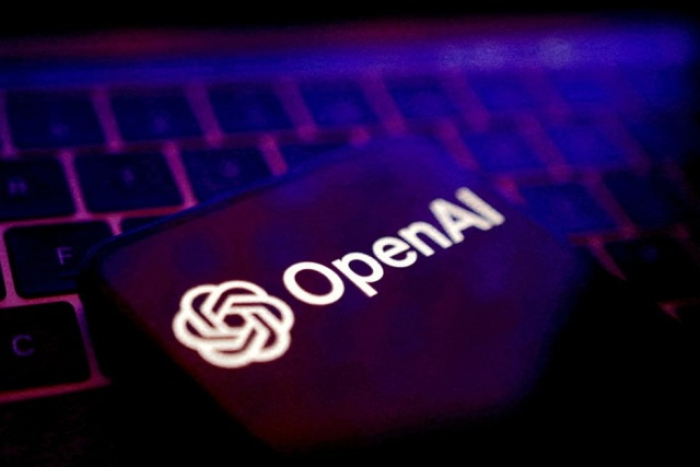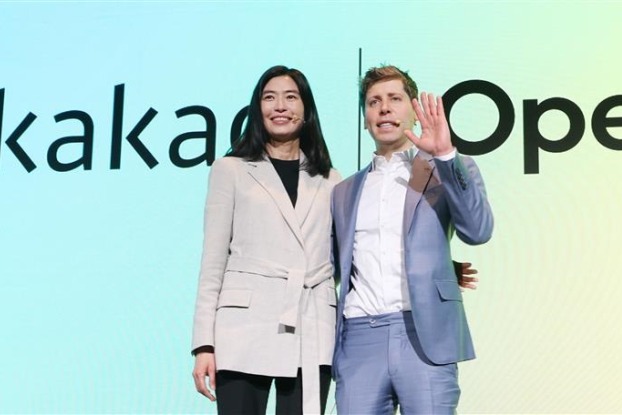Kakao Corp. is ramping up efforts to transform KakaoTalk, the dominant messenger app used by over 90% of South Korea’s 50 million people, into an artificial intelligence-powered super app through a partnership with OpenAI.
The Korean platform giant has been working with the world’s most valuable AI company to bring ChatGPT into its messenger app, according to industry sources.
After the two companies forged a strategic tie-up in February during Sam Altman’s Seoul trip, Kakao said it would integrate OpenAI’s most advanced application programming interface, alongside its own large language model, into its flagship services like KakaoTalk messenger and Kanana.
Kanana, Kakao’s first messenger embedded with a conversational AI agent, is designed to handle one-on-one and group chats, providing context-based responses.
Alongside ChatGPT, Kakao is also layering in AI-driven e-commerce and other services, aiming to upgrade Kanana and create synergies across its broader ecosystem.

OpenAI’s logo
All these moves are part of Kakao’s plan to turn Korea’s most popular messenger app into an AI super app, an all-in-one platform for messaging, payments, shopping and other services.
GLOBAL RACE TO BUILD AI SUPER APPS
The push to embed AI assistants has opened a new front among global messenger apps, with WhatsApp, WeChat and Line leading the charge.
“Bringing AI services into messenger platforms is a definite plus,” said Choi Seung-ho, an analyst at DS Investment & Securities Co. “The operators of platforms built around communication, such as Tencent, Meta and Line, are sustaining strong growth as a result.”
Meta operates a multinational messenger, WhatsApp, while Tencent and Line offer China’s No. 1 messenger app WeChat and Japan’s Line, respectively.
These apps are evolving beyond simple messaging into payments, shopping, customer services and now AI-powered functions that cover a user’s daily life.
(Graphics by Daeun Lee)
Tencent recently integrated its chatbot, Yuanbao, into WeChat, allowing users in China to interact with the AI service without downloading a separate app.
The AI chatbot enables WeChat users to search documents, create content and engage in immersive conversations without leaving the messenger app.
Yuanbao makes people spend more time on China’s most widely-used app, which already spans social media, messaging, short videos, payments, e-commerce and ride-hailing.
Meta has deployed its AI chatbot across WhatsApp, offering services such as image generation, chat summaries and voice-activated conversations.
Japan’s Line, owned by LY Corp., has rolled out its own AI assistant based on ChatGPT.
Analysts say AI is helping super apps overcome a longstanding weakness: their clutter. By simplifying navigation and making features easier to access, AI agents are boosting engagement and usability.
(Graphics by Daeun Lee)
TOSS AND COUPANG JOIN THE PUSH
Other Korean platform majors are also jumping into the AI super-app race.
Fintech firm Viva Republica has been expanding Toss, originally a money-transfer service, into a broader lifestyle platform. It now offers an array of functions, including basic messaging.
E-commerce powerhouse Coupang Inc. is using AI to move beyond its hallmark “Rocket Delivery” service into new categories such as travel and food delivery.
“Messaging apps are expanding into shopping and finance, while shopping and finance apps are moving into messaging,” said an industry executive.
“The super-app battle will heat up with highly advanced AI agents.”
Write to Eun-Yi Ko at koko@hankyung.com
Sookyung Seo edited this article.
